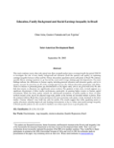Education, Family Background and Racial Earnings Inequality in Brazil
Date
Sep 2002
This study combines survey data with annual state data on pupil-teacher ratios covering broadly the period 1940-90 to investigate the role of race, family background and education (both the quantity and quality) in explaining earnings inequality between whites and the African descendent population (pretos and pardos) in Brazil. The authors estimate quantile Mincer earnings equations to go beyond the usual racial average earnings gaps decompositions. The main findings indicate that differences in human capital, including parental education and education quality, and in its returns, account for most but not all of the earnings gap between the African descendent population and whites. There is evidence of potential greater pay discrimination at the higher salary jobs at any given skill level. The authors also find that returns to education vary significantly across workers. The results suggest that while equalizing access to quality education, including improved early learning environments, is key to reduce inter-racial earnings inequality in Brazil, specific policies are also needed to facilitate non-whites equal access to good quality jobs.




